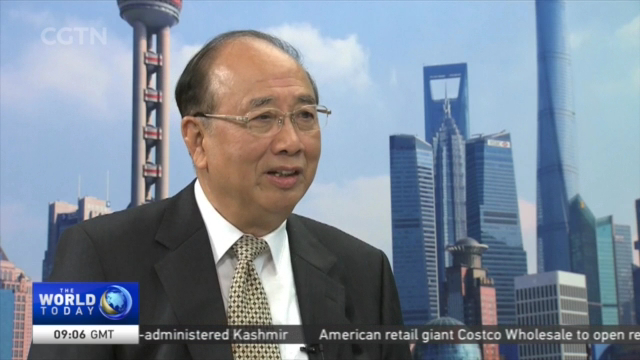
10:12, 26-Aug-2019
Hong Kong Riots: Better media communication needed between China and the West
Updated
10:32, 26-Aug-2019

China's former Director of the State Council Information Office, Zhao Qizheng, says some Western reporters are being unethical in their coverage of the Hong Kong protests. Zhao sat down with CGTN's Han Peng to share his views on better media communication between China and the West.
HAN PENG SHANGHAI "This time in Hong Kong, some western media seem to be very selective. Even the Hong Kong police shouted at these western reporters on the street, saying 'Why are you only shooting us? Why don't you shoot what the protesters are doing?' These protesters are actually using laser beams to point into the eyes of the policemen, which is very dangerous. Why do you think this time some of the western reporters are being so unprofessional?"
ZHAO QIZHENG, FORMER DIRECTOR STATE COUNCIL INFORMATION OFFICE "Most of the media around the world are selective in choosing what they shoot. If a reporter comes to Beijing and he does not like China, for example, he can choose to film a lot more shots of the trash bins than flowers, and still claim to be objective. But if 70 percent of his news story is focused on trash bins, with just a few shots of flowers, the viewers will easily regard Beijing as a city full of trash. What he should do is present the real proportion of flowers and trash in Beijing, because the duty of a real journalist is to report the world as it really is, rather than select, if not fake, his coverage. That's why I believe some media are being excessively selective in their reports on Hong Kong, and they have failed to live up to the trust the public puts in them."
HAN PENG SHANGHAI "If we accuse the Western media of hiding some of the facts and trying to be selective, can we tell the world that we are not hiding any single fact in Hong Kong in our report?"
ZHAO QIZHENG, FORMER DIRECTOR STATE COUNCIL INFORMATION OFFICE "There are at least two reasons why some facts have not been reported. One is deliberate hiding of facts, and the other is missing some of the shots in a very complicated news event. Deliberate hiding of facts is unethical, but missing some shots unintentionally may be a result of negligence. I cannot say Chinese media have never missed any facts, but we need to look into the reasons. As for the Western media, not all of them are deliberately against China, either. When I was in charge of the State Council Information Office, I noticed there were some Western reporters who tried very hard to be objective. But unfortunately, when his or her report was filed back to their headquarters, in most cases their boss would say, 'Come on, how can this be true?' And they refused to publish it."
HAN PENG SHANGHAI "That's exactly the question I want to ask, how can the Chinese media or any Chinese people communicate with the rest of the world, to the people who are who fundamentally disbelieve the fact that is actually happening here in China?"
ZHAO QIZHENG, FORMER DIRECTOR STATE COUNCIL INFORMATION OFFICE "I believe time is our best teacher. In this chaos of Hong Kong, it's always the younger people who are on the frontline, and the older people have stayed behind the scenes. As these young people grow up, they may ask, 'Why is it always me on the front, breathing in the tear gas and attacking the police? Where are the people who ordered me around?' Well, those behind the scenes have gone to the United States and Europe to further their studies. Yes, these people are young, but they are not stupid. It takes time for them to realize this."
HAN PENG SHANGHAI "In your newly published book 'Communication with media in two decades', you share quite a lot of experience and expertise of how we should tell the stories to the world, how we can explain and introduce China to the world. While it's understandable that you try to pass down a lot of your good experience, why do you translate them into two different foreign languages versions into English and Japanese? What do you think is the most important message you try to send to these readers?"
ZHAO QIZHENG, FORMER DIRECTOR STATE COUNCIL INFORMATION OFFICE "In China, spokespersons help make the government more transparent. When an emergency event occurs, the public needs to know what the government is thinking and doing, so that they can support and at the same time scrutinize the government. This will significantly reduce corruption and inefficiency, which is beneficial to our governance. The reason why I got the book translated into English and Japanese, and probably more languages in the future, is that I hope the foreign reporters can give it a read. I want to let them know that China has no intention of hiding the facts from the media, because that goes against our own interest. We want our work to benefit China, and telling the truth is in China's best interest."
SITEMAP
Copyright © 2018 CGTN. Beijing ICP prepared NO.16065310-3
Copyright © 2018 CGTN. Beijing ICP prepared NO.16065310-3